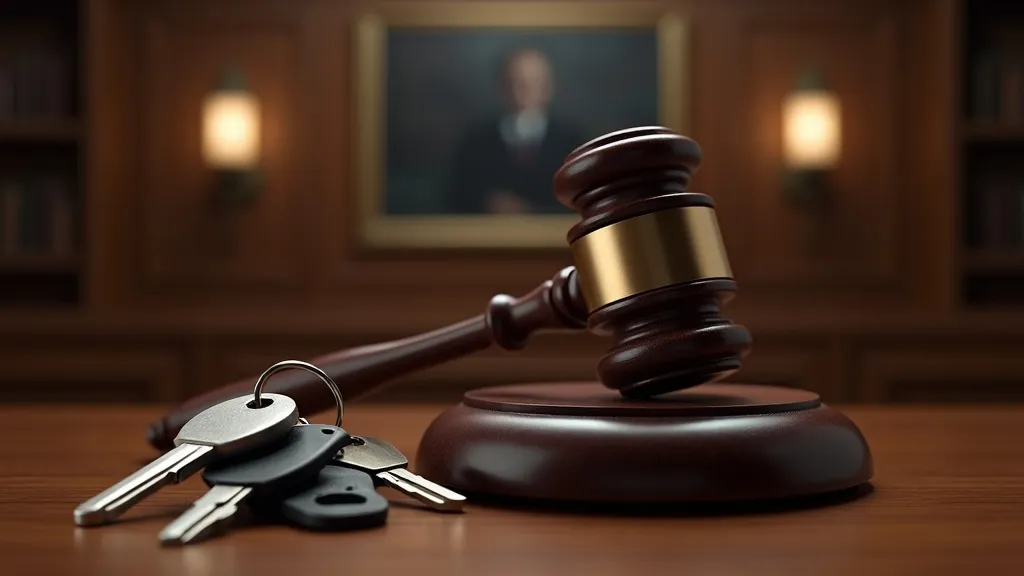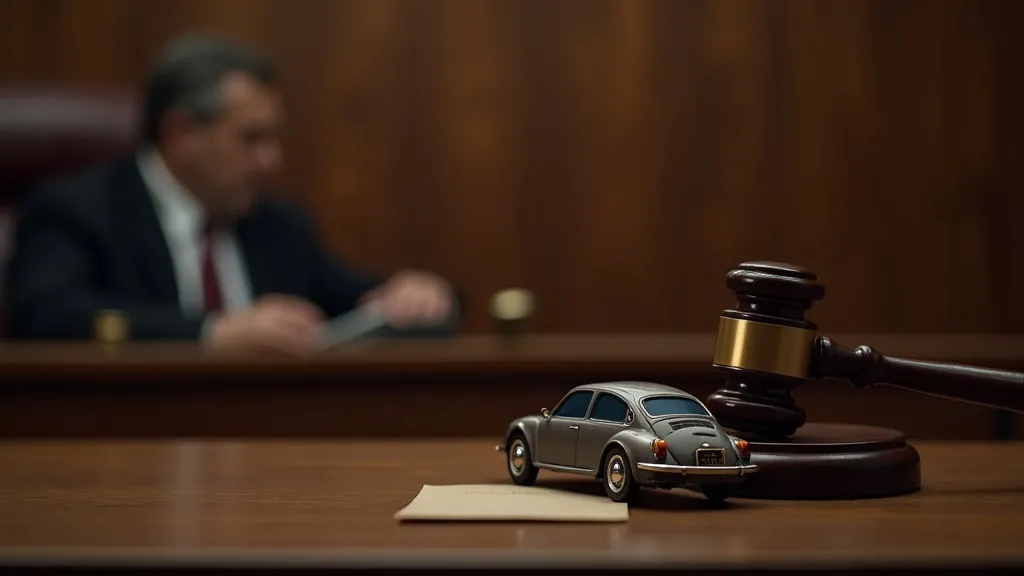Navigating Wrongful Repossession Issues
Wrongful repossession is a distressing event where a creditor unlawfully seizes a debtor's property, often due to errors or miscommunication. Understanding your rights and the legal landscape is crucial for navigating these challenges effectively. This article provides insights into wrongful repossession, offering guidance on how to address such situations and seek redress if your property has been wrongfully taken.

Understanding Wrongful Repossession
Wrongful repossession occurs when a lender or creditor unlawfully seizes a debtor's property, typically a vehicle, without adhering to legal protocols. This situation can arise from misunderstandings, administrative errors, or unethical practices by the repossessing entity. Knowing your rights and understanding the legal framework surrounding repossession is vital for effectively addressing these issues. The emotional and financial stress caused by wrongful repossession can significantly impact individuals and families, making it essential to grasp the intricacies of the process and the protections afforded to debtors under the law.
Legal Framework and Consumer Rights
In various jurisdictions, repossession laws require creditors to follow specific legal procedures before seizing property. These procedures include providing the debtor with sufficient notice and ensuring the repossession is conducted without breaching the peace. Failure to comply with these regulations can render a repossession wrongful, giving the debtor grounds to contest the action. In the United States, for example, the Uniform Commercial Code (UCC) governs secured transactions, including repossession. This code provides a framework that dictates how repossessions should be carried out, ensuring that debtors are treated fairly and legally.
Moreover, consumer protection laws exist at both federal and state levels to safeguard individuals against unfair practices by lenders. The Fair Debt Collection Practices Act (FDCPA) is one such law that restricts the actions of debt collectors and aims to prevent harassment and abusive practices. Understanding these laws is crucial for consumers, as they empower individuals to challenge and rectify wrongful actions taken by creditors.
Common Causes of Wrongful Repossession
- Administrative Errors: Mistakes in record-keeping or payments not being accurately recorded can lead to wrongful repossession. These errors can include failing to update payment statuses, misplacing documents, or miscalculating the amount owed.
- Unauthorized Actions: Some lenders may bypass legal procedures, leading to unlawful seizures. This can occur when a repossession agent exceeds their authority or acts without proper legal backing.
- Miscommunication: Poor communication between the lender and borrower can result in misunderstandings regarding payment agreements. For instance, if a borrower believes a payment extension was granted but the lender does not acknowledge it, the borrower may face repossession unexpectedly.
- Changes in Financial Circumstances: Life events such as job loss, medical emergencies, or other financial strains can lead to missed payments. However, lenders must still adhere to legal requirements before proceeding with repossession.
- Fraudulent Practices: In some cases, individuals may engage in fraudulent activities, such as falsifying documents to claim wrongful repossession. This can complicate legitimate claims and create distrust in the system.
Steps to Address Wrongful Repossession
- Review Your Contract: Begin by thoroughly reviewing your loan agreement to understand the terms and any clauses related to repossession. Pay close attention to the requirements for notice and the conditions under which the lender is allowed to repossess the property.
- Gather Evidence: Collect all relevant documentation, including payment receipts, bank statements, and communication records with the lender. Evidence of timely payments or prior agreements can bolster your case.
- Contact Your Lender: Reach out to your lender to discuss the situation and seek an explanation for the repossession. Be polite but firm, and document all conversations for your records. This step is crucial as it shows that you are taking proactive steps to resolve the issue.
- Seek Legal Advice: If the lender is uncooperative, consult with a legal professional to explore your options and potential remedies. An attorney specializing in consumer rights or repossession cases can provide guidance on the best course of action.
- File a Complaint: Consider filing a complaint with consumer protection agencies or relevant regulatory bodies if the issue remains unresolved. This may include the Consumer Financial Protection Bureau (CFPB) or your state’s attorney general’s office. Complaints can lead to investigations that may help in resolving your situation.
Potential Remedies and Compensation
If a repossession is deemed wrongful, the debtor may be entitled to several remedies, including:
- Return of Property: The repossessed item should be returned to the debtor. This is often the most immediate remedy sought by those who have experienced wrongful repossession.
- Compensation for Damages: The debtor may receive compensation for any damages incurred due to the wrongful repossession. This can include repair costs if the vehicle was damaged during the repossession process or lost wages if the debtor needed the vehicle to commute to work.
- Legal Fees: In some cases, the lender may be required to cover the debtor's legal fees. This can alleviate the financial burden on the debtor, who may already be facing significant challenges due to the repossession.
- Emotional Distress Damages: Depending on the jurisdiction, debtors may also seek compensation for emotional distress resulting from the wrongful repossession. The stress and anxiety of losing a vehicle can have lasting effects on an individual's mental health.
- Restoration of Credit: A wrongful repossession can severely impact a debtor's credit score. As part of the remedy, lenders may be required to correct any negative reporting to credit bureaus resulting from the wrongful action.
Comparison Table: Legal Requirements vs. Wrongful Actions
| Legal Requirement | Common Wrongful Action |
|---|---|
| Provision of Notice | Failure to notify the debtor |
| Peaceful Repossession | Use of force or intimidation |
| Accurate Record Keeping | Errors in payment records |
| Timely Communication | Ignoring borrower inquiries |
| Compliance with State Laws | Operating outside legal jurisdiction |
FAQs
Q: What should I do if I suspect wrongful repossession?
A: Begin by reviewing your loan agreement and gathering evidence. Contact your lender for clarification, and consider seeking legal advice. Documenting your steps is crucial in building your case.
Q: Can I get my vehicle back after wrongful repossession?
A: Yes, if the repossession is proven wrongful, the vehicle should be returned, and you may be entitled to compensation. The process of retrieval may involve legal proceedings, depending on the lender's cooperation.
Q: How can I prevent wrongful repossession?
A: Ensure timely payments, maintain clear communication with your lender, and keep detailed records of all transactions and correspondence. Being proactive in these areas can significantly reduce the likelihood of wrongful repossession.
Q: What types of properties can be subject to repossession?
A: While vehicles are the most commonly repossessed items, other properties can also be subject to repossession, including furniture, electronics, and even real estate in certain situations, depending on the terms of the loan agreement.
Q: Is there a statute of limitations for wrongful repossession claims?
A: Yes, wrongful repossession claims are subject to statutes of limitations that vary by state. It is essential to act promptly and consult with a legal professional to ensure your claim is filed within the appropriate timeframe.
Wrongful repossession can be a distressing experience, but understanding your rights and the legal framework can empower you to address and resolve the situation effectively. By staying informed and proactive, you can protect your interests and seek appropriate remedies if your property is wrongfully taken. Additionally, becoming aware of your state's specific laws regarding repossession can bolster your defense and enhance your ability to navigate this challenging landscape.
Furthermore, it’s critical to understand the psychological impact that wrongful repossession can have on individuals. Losing a vehicle can disrupt daily life, affecting employment, transportation, and family responsibilities. The emotional toll can be significant, leading to feelings of helplessness and frustration. Recognizing this aspect is essential for those involved in the repossession process, including lenders, repossession agents, and legal professionals, who should strive to handle these cases with sensitivity and understanding.
Education on financial management and debt obligations can also play a pivotal role in preventing wrongful repossession. Borrowers should be equipped with the knowledge necessary to manage their debts effectively and understand their rights under the law. Financial literacy programs and resources can empower individuals to make informed decisions and potentially avoid situations that lead to repossession.
Finally, advocacy groups and consumer protection organizations can serve as valuable resources for individuals facing wrongful repossession. These organizations often provide support, guidance, and legal assistance to those in need, helping to navigate the complex landscape of repossession laws and consumer rights. Engaging with such groups can offer a sense of community and support during challenging times, reinforcing the importance of collective action in advocating for fair treatment and justice in financial matters.
-
1

Explore Thrilling Adventures: Unveil the World's Very Exciting Travel Destinations
-
2

Unlock the Secrets to Maximize Your Kona SUV's Fuel Economy
-
3

Unlock the Highest Resale Profit: Expert Tips for Boosting Your Kona SUV's Value
-
4

Effortless Adaptation to Senior Apartment Living: Master the Transition with This Ultimate Strategy
-
5

Transform Your Senior Apartment into a Cozy and Charming Retreat: Personalized Touches to Make It Truly Home









